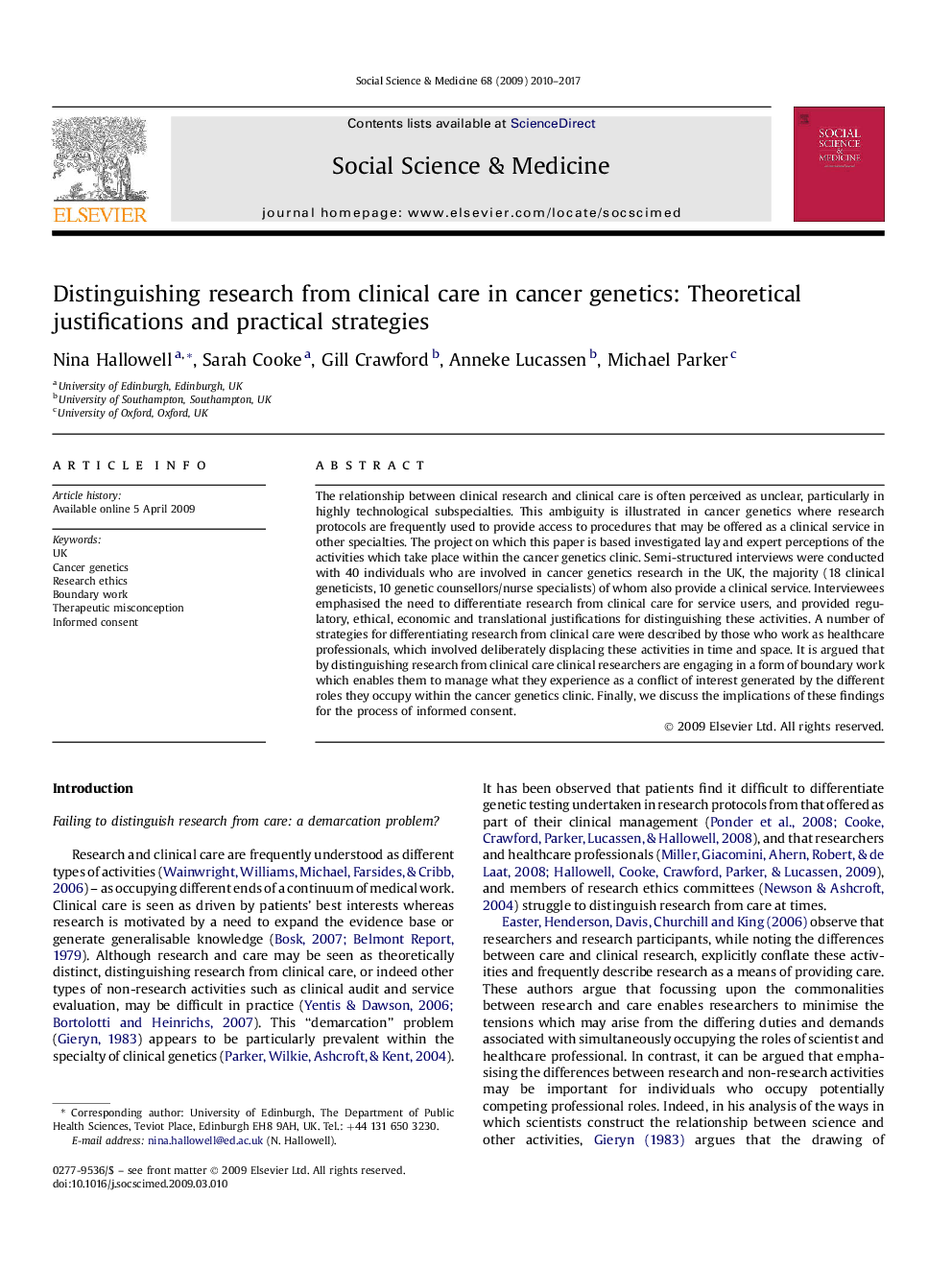| کد مقاله | کد نشریه | سال انتشار | مقاله انگلیسی | نسخه تمام متن |
|---|---|---|---|---|
| 10472192 | 927613 | 2017 | 8 صفحه PDF | دانلود رایگان |
عنوان انگلیسی مقاله ISI
Distinguishing research from clinical care in cancer genetics: Theoretical justifications and practical strategies
ترجمه فارسی عنوان
تحقیق متمایز از مراقبت های بالینی در ژنتیک سرطان: توجیه های نظری و استراتژی های عملی
دانلود مقاله + سفارش ترجمه
دانلود مقاله ISI انگلیسی
رایگان برای ایرانیان
کلمات کلیدی
انگلستان، ژنتیک سرطان، اخلاق تحقیق، کار مرزی، تصور غلط درمانی، رضایت آگاهانه
ترجمه چکیده
ارتباط بین تحقیقات بالینی و مراقبت های بالینی اغلب به عنوان مشخص نیست، به ویژه در بخش های بسیار تکنولوژیک. این ابهام در ژنتیک سرطان نشان داده شده است که پروتکل های تحقیقاتی اغلب برای دسترسی به روش هایی که ممکن است به عنوان یک سرویس بالینی در سایر تخصص ها ارائه شوند، استفاده می شود. پروژه ای که در این مقاله مبتنی بر تحقیق و بررسی نگرش کارشناسان از فعالیت های انجام شده در کلینیک ژنتیک سرطان بررسی شده است. مصاحبه نیمه ساختار یافته با 40 نفر که در تحقیقات ژنتیک سرطان در انگلستان مشغول به فعالیت هستند، اکثریت (18 ژن درمانی بالینی، 10 مشاور ژنتیک / متخصص پرستاری) نیز خدمات بالینی را ارائه می دهند. مصاحبه شوندگان تاکید کردند که نیاز به تفکیک تحقیق از مراقبت های بالینی برای کاربران سرویس و ارائه توجیه قانونی، اخلاقی، اقتصادی و ترجمه برای تشخیص این فعالیت ها. تعدادی از استراتژی ها برای تمایز تحقیق از مراقبت های بالینی توسط افرادی که به عنوان متخصصان مراقبت های بهداشتی مشغول به کار بودند، به طور عمدی جایگزین این فعالیت ها در زمان و مکان شدند. استدلال می شود که با تشخیص پژوهش از مراقبت های بالینی، محققان بالینی در حال شکل گیری کار مرزی هستند که آنها را قادر می سازد تا آنچه را که به عنوان یک درگیری از منافع ایجاد شده توسط نقش های مختلفی که در کلینیک ژنتیک سرطان به سر می برند مدیریت کنند. در نهایت، ما در مورد پیامدهای این یافته ها برای روند رضایت آگاهانه بحث می کنیم.
موضوعات مرتبط
علوم پزشکی و سلامت
پزشکی و دندانپزشکی
سیاست های بهداشت و سلامت عمومی
چکیده انگلیسی
The relationship between clinical research and clinical care is often perceived as unclear, particularly in highly technological subspecialties. This ambiguity is illustrated in cancer genetics where research protocols are frequently used to provide access to procedures that may be offered as a clinical service in other specialties. The project on which this paper is based investigated lay and expert perceptions of the activities which take place within the cancer genetics clinic. Semi-structured interviews were conducted with 40 individuals who are involved in cancer genetics research in the UK, the majority (18 clinical geneticists, 10 genetic counsellors/nurse specialists) of whom also provide a clinical service. Interviewees emphasised the need to differentiate research from clinical care for service users, and provided regulatory, ethical, economic and translational justifications for distinguishing these activities. A number of strategies for differentiating research from clinical care were described by those who work as healthcare professionals, which involved deliberately displacing these activities in time and space. It is argued that by distinguishing research from clinical care clinical researchers are engaging in a form of boundary work which enables them to manage what they experience as a conflict of interest generated by the different roles they occupy within the cancer genetics clinic. Finally, we discuss the implications of these findings for the process of informed consent.
ناشر
Database: Elsevier - ScienceDirect (ساینس دایرکت)
Journal: Social Science & Medicine - Volume 68, Issue 11, June 2009, Pages 2010-2017
Journal: Social Science & Medicine - Volume 68, Issue 11, June 2009, Pages 2010-2017
نویسندگان
Nina Hallowell, Sarah Cooke, Gill Crawford, Anneke Lucassen, Michael Parker,
